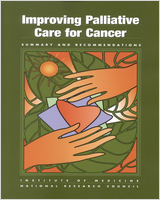| Pain |
Elucidate basic mechanisms of visceral and neuropathic pain; identify new treatments Identify modifications of nervous system involved in chronic pain perception Find new compounds with more precise analgesic action and fewer side effects Find molecular basis of pain signaling, receptor modification due to pain, and ways to modify Identify forebrain structures that modulate responses to “painful” signals Determine receptor affinities of different opioids
|
Determine why so many patients have poorly controlled pain Study ways to improve cancer pain management Determine effectiveness of treatments for neuropathic pain Determine effects of cancer on tolerance to opioid analgesics and how pain can be managed in already tolerant patients Determine side-effect profiles of different opioids Conduct trials of intrathecal delivery of novel analgesics
|
| Anorexia or Cachexia |
| Conduct clinical trials of
Proinflammatory mediators Appetite stimulants Anticatabolic agents (e.g., neuropeptide agonists or antagonists, beta2-adrenoceptor agonists) Polyunsaturated fatty acids, n-3 fatty acids, fish oil Anabolic agents (especially hormonal) Anticytokines (e.g., megestrol acetate, medroxyprogesterone acetate, thalidomide, melatonin)
|
| Cognitive failure: delirium, temporary and permanent cognitive impairment |
Elucidate underlying mechanisms of delirium and cognitive impairment Identify role of cancer disease process in cognitive impairment Determine how biological therapies (e.g., interferon alpha, interleukin-2) produce cognitive impairment Find biological markers for patients most at risk of delirium or cognitive impairment
|
Develop standardized assessment for delirium Determine prevalence, nature, and current treatments for delirium and cognitive impairment Conduct clinical trials of Require neuropsychological assessments in cancer treatment trials to determine whether drugs are causing cognitive impairment
|
| Dyspnea |
Standardize measurement and assessment Develop animal model Determine relationship of dyspnea to anemia in chronic illness Determine role of respiratory muscle metabolism and function Elucidate link between cachexia, tumor necrosis factor, muscle fatigue or weakness, and dyspnea
|
Study prevalence, severity, and current treatment Conduct clinical trials of opioids by different routes of administration Conduct clinical trials of other agents (e.g., corticosteroids)
|
| Fatigue |
| Conduct clinical trials of
|
| Gastrointestinal symptoms |
|
Study prevalence, severity and current treatment of terminal nausea Conduct clinical trials of agents for nausea of advanced disease and for bowel obstruction
|
| Psychiatric or affective symptoms |
|
Describe current management in advanced disease Conduct clinical trials of standard antidepressants, especially SSRIs; stimulant therapies (e.g., methylphenidate); and agents for terminal agitation or restlessness Consider trials of novelagents: “empathogens”
|
